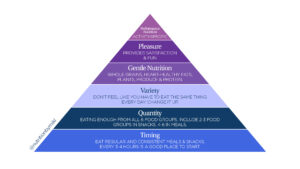There are drug-free ways to quiet the food noise.
In a world where conversations about weight loss often revolve around medications like Ozempic and Wegovy, a new term has surfaced: food noise. People taking these medications claim they experience a quieter mind, less preoccupied with food. But what about those of us searching for drug-free ways to achieve the same peace?
Studio 5 Health Contributor Miki Eberhardt sheds light on this intriguing concept.
Find more advice from Miki on Instagram, @nutritionbymiki.
How to Quiet the Food Noise
Understanding Food Noise
Food noise, as Miki defines it, is the constant, intrusive obsession with food. It’s not just about meal planning; it’s an overwhelming preoccupation with what to eat, how to satisfy cravings, and a never-ending cycle of searching for food-related solutions.
The Spectrum of Food Noise
Miki explains that there’s a spectrum to food noise. It ranges from normal hunger cues to constant cravings and an obsession with food. For many, this noise becomes exhausting, occupying valuable mental bandwidth that could be better utilized elsewhere.
Drug-Free Solutions
Miki offers practical, drug-free alternatives to quieting the food noise:
- Trade Lack of Planning for Planning: Just like Steve Jobs wore the same clothes daily to avoid decision fatigue, planning meals and snacks in advance reduces the mental load associated with constant food thoughts.
- Replace Measuring for Listening: Instead of obsessively tracking every morsel, learn to listen to your body. Trust yourself and recognize hunger cues. Building this self-awareness creates a healthier relationship with food.
- Replace Restricting for Forgiving: Restrictive diets often backfire, intensifying food noise. Allow yourself treats in moderation, and don’t deprive your body of essential nutrients. Forgiving yourself for indulgences reduces the mental pressure associated with food.
- Trade Compensating for Problem Solving: Rather than using food to cope with stress or emotions, seek healthier outlets like therapy, yoga, meditation, or better sleep. Addressing the root cause of emotional eating can significantly reduce food noise.
The Balanced Pyramid Approach
Miki introduces a pyramid model, emphasizing the importance of balanced eating. The foundation includes regular meals and snacks, ensuring adequate quantity, variety, and gentle nutrition. Pleasure, represented at the top, reminds us that enjoying food is a crucial part of the balanced equation.

Understanding and quieting food noise isn’t just a psychological fix; it’s a holistic approach that combines physical and mental well-being. By incorporating these drug-free strategies and embracing a balanced approach to eating, you can achieve a peaceful relationship with food, allowing your mind to focus on more important aspects of life.















Add comment